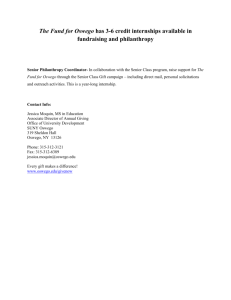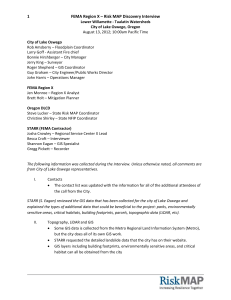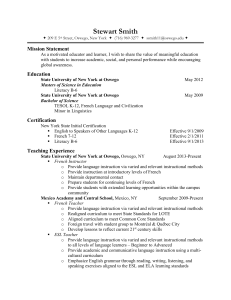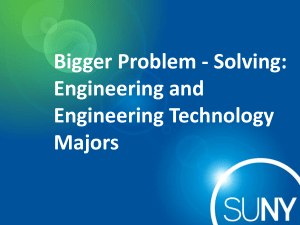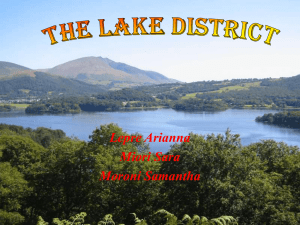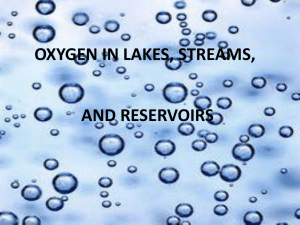CITY OF LAKE OSWEGO BROADBAND PARTNERSHIP
advertisement
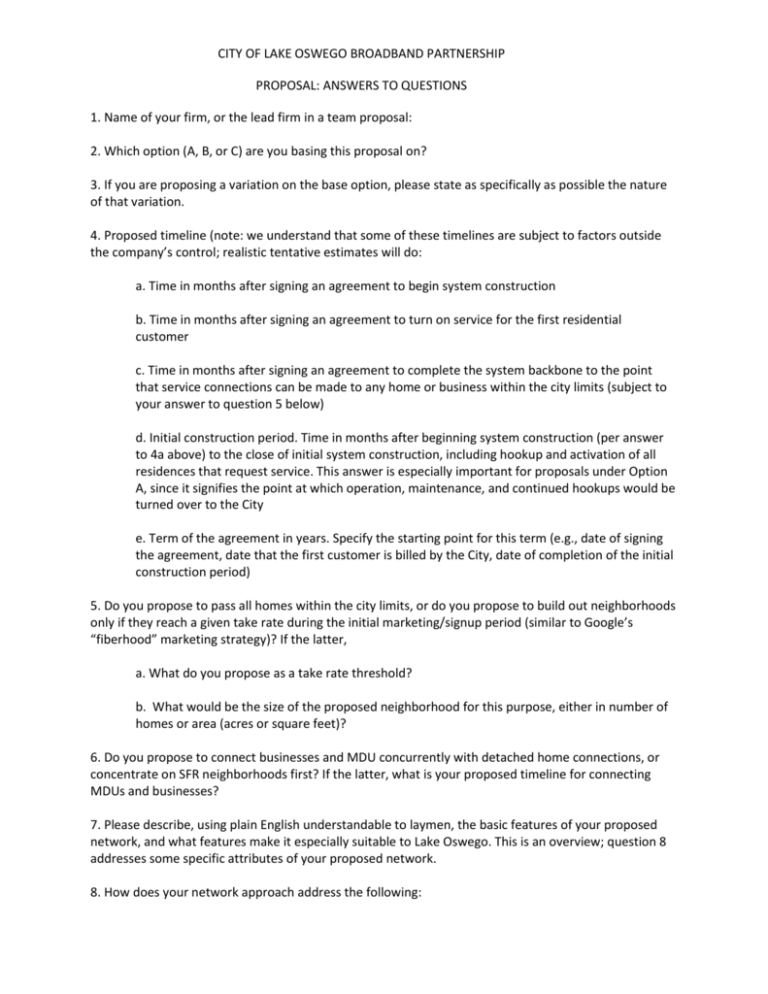
CITY OF LAKE OSWEGO BROADBAND PARTNERSHIP PROPOSAL: ANSWERS TO QUESTIONS 1. Name of your firm, or the lead firm in a team proposal: 2. Which option (A, B, or C) are you basing this proposal on? 3. If you are proposing a variation on the base option, please state as specifically as possible the nature of that variation. 4. Proposed timeline (note: we understand that some of these timelines are subject to factors outside the company’s control; realistic tentative estimates will do: a. Time in months after signing an agreement to begin system construction b. Time in months after signing an agreement to turn on service for the first residential customer c. Time in months after signing an agreement to complete the system backbone to the point that service connections can be made to any home or business within the city limits (subject to your answer to question 5 below) d. Initial construction period. Time in months after beginning system construction (per answer to 4a above) to the close of initial system construction, including hookup and activation of all residences that request service. This answer is especially important for proposals under Option A, since it signifies the point at which operation, maintenance, and continued hookups would be turned over to the City e. Term of the agreement in years. Specify the starting point for this term (e.g., date of signing the agreement, date that the first customer is billed by the City, date of completion of the initial construction period) 5. Do you propose to pass all homes within the city limits, or do you propose to build out neighborhoods only if they reach a given take rate during the initial marketing/signup period (similar to Google’s “fiberhood” marketing strategy)? If the latter, a. What do you propose as a take rate threshold? b. What would be the size of the proposed neighborhood for this purpose, either in number of homes or area (acres or square feet)? 6. Do you propose to connect businesses and MDU concurrently with detached home connections, or concentrate on SFR neighborhoods first? If the latter, what is your proposed timeline for connecting MDUs and businesses? 7. Please describe, using plain English understandable to laymen, the basic features of your proposed network, and what features make it especially suitable to Lake Oswego. This is an overview; question 8 addresses some specific attributes of your proposed network. 8. How does your network approach address the following: Page 2 of 3 a. Future-proofing. While we ask for 1Gbps asynchronous capability to every residence, initial average demand will be well under this level. Over time, however, subscribers may begin to approach this design capacity. To what extent is the network upgradeable to handle increasing demand for bandwidth? What is the practical limit of bandwidth that could simultaneously be available to all homes? b. Resiliency. If a fiber in the system backbone is cut, what is the maximum number of homes that would be affected? What other features of your proposed network will help ensure 99.999% up time? c. What are the approximate dimensions of your Network Operations Center, assuming you will need to construct a new building or structure for this purpose? What are the approximate dimensions of network splitter cabinets and pedestals, and roughly how many homes will be served by each? Can pedestals be installed underground if desired by the adjacent property owner? d. What kind of Optical Network Terminal will be installed in homes? Will it be mounted externally, with a CAT-6 connection into the home? Or will fiber be extended into the home, with the ONT placed at the customer’s choosing? Will it include a built-in WiFi router? e. With the understanding that final design and field conditions will determine construction techniques, what features of construction of the system will reduce costs or reduce disruption to residents and businesses? Do you plan to take advantage of aerial installation where possible, or will the system be fully underground? When underground, how will it be installed (standard trenching, directional boring, microtrenching, plowing, or some combination)? We acknowledge that many design issues will be worked out in consultation with the City’s Engineering and Public Works departments as well as other utilities such as PGE; this question is primarily intended to allow you to showcase any noteworthy features of your proposed installation methods. 9. Experience. Have you entered into a similar partnership with a city to provide a municipal broadband utility? If so, where and when? If not, what are the closest examples to the model you are proposing here? Your response can include links to information on the World Wide Web. 10. References. Please list at least three references, with phone and e-mail contact information, who can vouch for your company’s performance and integrity. If your company has done work for a local government under contract or agreement, local government references would be helpful. 11. For Option C Proposals Only. How do you propose to address: a. Customer service. Will you have a local customer service presence (e.g., a Lake Oswego storefront)? Will you have customer service staff dedicated specifically to Lake Oswego Broadband, or will you use your overall customer service staff and resources to handle Lake Oswego customer contacts? If a customer calls, will you answer the phone, “Lake Oswego Broadband,” or will you answer using the name of your corporate brand? If the City receives complaints about customer service, how would you address those complaints? Page 3 of 3 b. Billing. Will you bill customers for Lake Oswego Broadband service as a separate entity, or would you use a combined bill if you offer other public utility (e.g., phone) service? c. How will you ensure open access if this policy is at odds with your overall corporate policy, or with the way phone utility regulation is administered? Will other digital content providers be allowed free access to the subscriber’s Internet connection for IP-based content or services?
